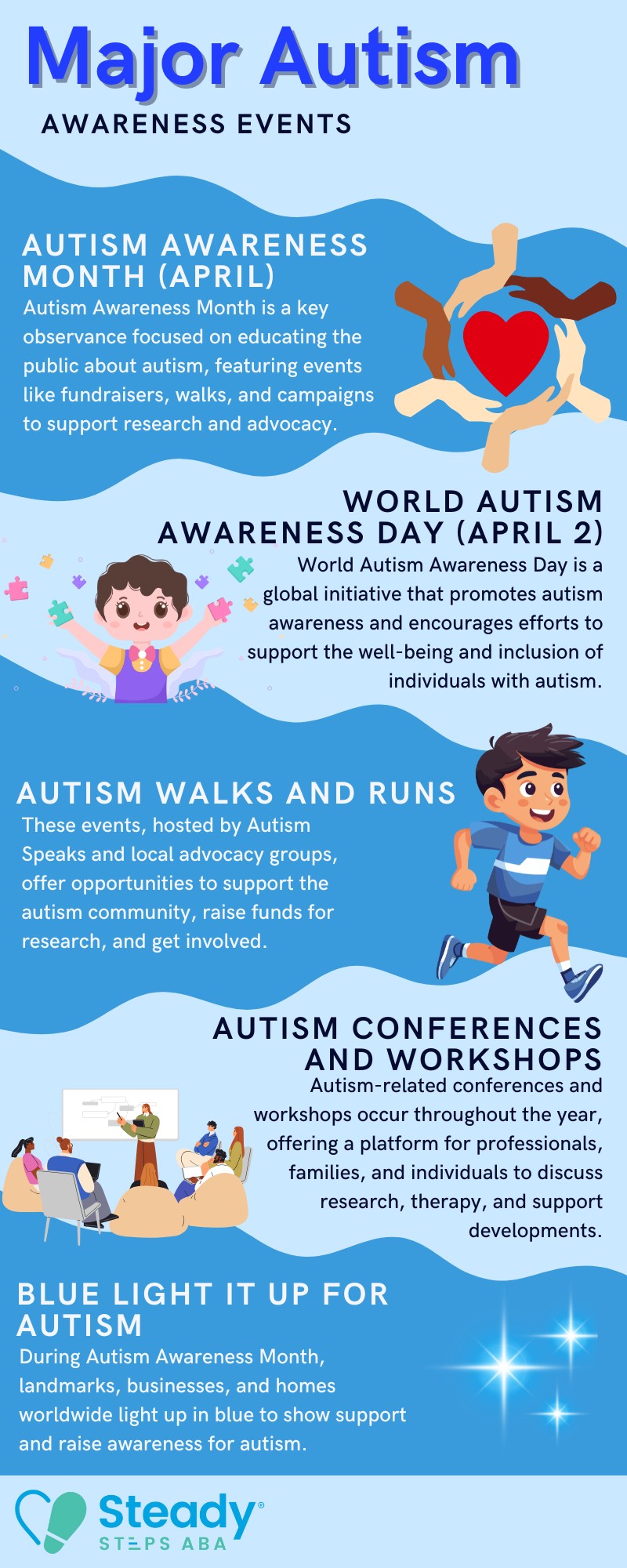Key Points:
- Autism awareness is crucial in promoting understanding and support for individuals with Autism Spectrum Disorder (ASD).
- Support for those with autism includes therapy, advocacy, and community involvement.
- Special events and observances, such as Autism Awareness Month, help spread knowledge and raise funds for autism-related causes.
Autism Spectrum Disorder (ASD) affects 1 in 36 children in the United States, according to the Centers for Disease Control and Prevention (CDC). Given its prevalence, autism awareness has become a critical part of fostering an inclusive society.
With greater understanding, we can provide better support for individuals with autism and their families. This includes advocating for necessary resources, providing therapeutic interventions, and encouraging social acceptance. Autism awareness is about more than just knowing the statistics—it’s about creating communities that embrace diversity and respond effectively to the needs of people on the autism spectrum. Fun facts about autism can help broaden awareness and foster a deeper connection with those who experience the world differently.
Through this article, we’ll explore the importance of autism awareness, the available support systems for individuals with ASD, and the events that promote education and advocacy.
What is Autism Awareness?
Autism awareness refers to the global efforts to increase understanding and acceptance of Autism Spectrum Disorder (ASD). The goal is to inform individuals about the characteristics of autism, the challenges faced by people with autism, and how they can support those with ASD in their communities. Raising awareness is key to breaking down stereotypes and misconceptions surrounding autism and fostering inclusivity.
Autism awareness efforts often focus on educating the public, healthcare providers, educators, and families about the signs of autism and early intervention. These initiatives aim to ensure that individuals with autism receive the support they need to live fulfilling lives. In addition, awareness promotes advocacy for resources, therapies, and legislation that support individuals on the spectrum.
The most well-known initiative for autism awareness is Autism Awareness Month, observed every April. During this month, numerous events, fundraisers, and educational campaigns take place globally to help spread knowledge about autism.
Why is Autism Awareness Important?
Raising autism awareness is essential for creating a society that is both accepting and supportive of individuals with autism. When awareness levels rise, misconceptions and stigmas surrounding autism begin to dissipate, allowing individuals on the spectrum to access better opportunities for growth, education, and social involvement.
Understanding autism and its challenges helps individuals—whether they are family members, educators, or professionals—create an environment that fosters acceptance and understanding. It also helps communities create more resources and spaces that are accessible to everyone, including those with autism.
Another key reason autism awareness is important is that it helps foster early diagnosis and intervention. The earlier autism is recognized, the sooner appropriate therapies and interventions can be implemented, leading to improved outcomes for children on the spectrum.
6 Types of Support for Individuals with Autism
Support for individuals with autism comes in many forms, including therapy, educational services, and community programs. These support systems play a pivotal role in helping individuals with ASD develop critical life skills, communicate more effectively, and navigate the challenges they face. Some of the most essential types of support include:
1. ABA Therapy
ABA (Applied Behavior Analysis) therapy is one of the most effective treatments for autism. It focuses on teaching positive behaviors and skills while reducing unwanted behaviors. ABA therapy is tailored to the needs of the individual and is delivered in various settings such as home, school, and therapy centers.
2. Speech Therapy
Many individuals with autism have difficulty with communication. Speech therapists work on improving verbal and non-verbal communication skills, helping individuals better express their needs and interact with others.
3. Occupational Therapy
Occupational therapy helps individuals with autism develop the skills necessary for daily living, such as dressing, eating, and managing personal hygiene. It can also help address sensory processing issues common in people with autism.
4. Support Groups and Advocacy Organizations
Support groups allow individuals and families affected by autism to share experiences, access resources, and receive emotional support. Organizations like the Autism Society of America and Autism Speaks provide advocacy, information, and resources for families and individuals with autism.
5. Educational Support
Specialized educational programs and individualized learning plans (IEPs) ensure that children with autism receive the appropriate support within the classroom. Teachers and specialists can work together to provide a more inclusive environment for students with ASD.
6. Community Programs
Local organizations often provide recreational programs and activities for individuals with autism, which can help develop social skills, build friendships, and foster independence.
5 Major Autism Awareness Events
Autism awareness is promoted globally through events that celebrate individuals with autism, raise funds for research, and increase understanding of ASD. Some of the most significant events include:

The Role of ABA Therapy in Autism Awareness
One of the most powerful and well-researched therapies for autism is ABA therapy (Applied Behavior Analysis). ABA therapy has become an essential part of autism treatment because it focuses on teaching practical skills that enhance an individual’s independence and quality of life.
ABA therapy is grounded in scientific principles and uses reinforcement and shaping techniques to help individuals with autism learn new behaviors and reduce challenging ones. Because autism affects each person differently, ABA therapy is customized to fit the needs of each individual. It can address a wide range of skills, from communication and social interaction to daily living activities.
Families often find that ABA therapy not only helps their children manage challenging behaviors but also provides them with tools to support their child’s growth and development outside of therapy. As autism awareness grows, more families have access to ABA therapy, ensuring better outcomes for individuals with autism.
Empower Your Child with ABA Therapy
If you’re looking for a trusted provider of ABA therapy in Maryland, Steady Steps ABA is here to help. Our team of dedicated professionals offers personalized ABA therapy services designed to support children and individuals with autism in reaching their full potential.
At Steady Steps ABA, we understand the importance of autism awareness and are committed to providing therapy that empowers families and individuals. With customized treatment plans, our therapy is designed to address your child’s unique needs, fostering progress and growth in all areas of life.
Contact us today to learn more about how ABA therapy can make a positive impact on your child’s life.






